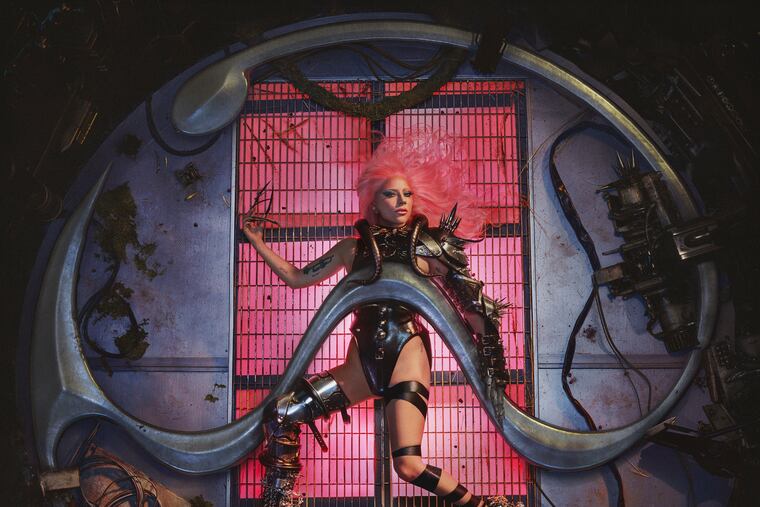Lady Gaga’s ‘Chromatica’ returns her to the dance floor. But is anybody in the mood to dance? | Review
Gaga's return to four-on-the-floor dance music is ill-timed, but it will be waiting when we're ready. Carly Rae Jepsen's new release is one perfect pop song after another.

Lady Gaga
Chromatica
(Interscope ***)
The title to Lady Gaga’s new album refers to a mythical planet inhabited by “kindness punks” where all sentient beings treat each other with dignity and respect. If only Chromatica could transport us all there. Instead, we’ll have to settle for its being a distraction from a heartbreaking time, arriving into a world that Gaga could never have imagined.
The album returns the singer to the four-on-the-floor house music that made her a superstar on 2008’s The Fame and 2011’s Born This Way. Its original April release date was postponed because of the coronavirus pandemic. But Gaga eventually decided that what restless fans needed after two months of lockdown limbo was a party-starting jolt — even if forced to get their grooves on from a social distance.
A good thought, but bad timing: The album’s delayed release, this week, coincided with the protests in response to George Floyd’s death and police brutality. Gaga’s dance pop album ended up arriving at a time when no one is in the mood to dance.
When they eventually are, the ballad-free Chromatica will be there for them. In stark contrast to the 2014 Tony Bennett duet album Cheek to Cheek and 2016’s earnest, acoustic-flavored Joanne, this is a collection that revs up the energy.
The album is rarely as provocative as Gaga was back when she wore dresses made of meat — though the over-the-top Elton John duet “Sine From Above” tries hard. But it is a proficient party starter, with a personal story line beneath a glossy surface.
“This is my dance floor, I fought for,” she sings out in “Free Woman.” The song “911” is about how an antipsychotic drug aided her in beating back chronic pain and PTSD from having been raped as a teenager. “Plastic Doll” explores the dehumanizing aspects of fame.
“Fun Tonight” expresses frustration with living in isolation — emotionally, or otherwise: “Feel like I’m in a prison hell,” she sings. “Stick my hands through the steel bars and yell.”
— Dan DeLuca
Carly Rae Jepsen
Dedicated Side B
(604/Schoolboy/Interscope *** 1/2)
“For fans only” is a cheeky term — who else would be listening? Jepsen might as well be Marshall Crenshaw now, because A) she’s unlikely to storm the airwaves again, and B) she still writes perfect pop song after perfect pop song like they’re journal entries.
After 2012’s undervalued Kiss and the overcompensating accolades for 2015’s E•MO•TION, last year’s Dedicated was more or less correctly received as Good, adding “Want You in My Room” and “The Sound” to the canon.
But “fans” know all about her shadow discography, because E•MO•TION Side B and the loosie “Cut to the Feeling” and now Dedicated Side B rival and often best her “proper” albums.
Culled from a purported 200 tunes, this new release opens with the candy rush of “This Love Isn’t Crazy” — an immediate improvement on Dedicated. “Window” and the showstopping “Heartbeat” reveal an increasing knack for utilizing negative space.
The new-wave drums and glockenspiel that propel “Let’s Sort the Whole Thing Out” make you wish she’d do a whole rock album. Time to release the other 173.
— Dan Weiss
Muzz
Muzz
(Matador, ***)
Paul Banks, the singer for Interpol, has a deep, thoughtful, resonant voice that commands the focus in any setting, even when he’s tried to reposition it in his solo project Julian Plenti or his hip-hop partnership with the Wu-Tang Clan’s RZA in Banks + Steelz.
His baritone anchors Muzz, his new collaboration with multi-instrumentalist Josh Kaufman (of Bonny Light Horseman) and drummer Matt Barrick (of the Walkmen). Although it’s the first time all three have worked together, they have a lot of triangulating history, going back to Banks’ and Kaufman’s high school friendship. The album was recorded in Philly, where Barrick lives.
Kaufman has played guitar with the National and the War on Drugs, and he brings some of their artfully layered soundscapes to Muzz. The album isn’t as ponderous or portentous as Interpol can be, and the occasional horns and strings broaden the palette on songs such as the lovely “Everything Like It Used to Be” and “All is Dead to Me.”
Although Muzz can get loud, as on the dramatic, feedback-laced “Knuckleduster,” they are often best when working with subtle restraint, as on the ballad “Summer Love” and the quietly propulsive “Chubby Checker.”
It’s easy to hear echoes of 20-odd years of New York-centric indie rock in Muzz, but that’s because Banks, Barrick, and Kaufman embody that history.
— Steve Klinge